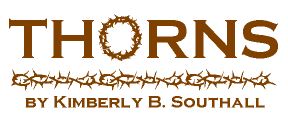
| Please note: Each scripture
is linked to The Bible Gateway. Scriptures will open in a separate
window in your browser while this window will also remain open. You
can click back and forth between the two windows. Once you have read
all of the scriptures, you can close that window. |
One of the torments which accompanied Jesus' crucifixion
was that a crown of thorns was placed on His head
(Matthew
27:29; Mark
15:17; John
19:2, 5). Was this just one more thing designed to
cause Him physical pain, or was there some other significance to it? I
searched the scriptures for references to thorns for an answer.
Thorns weren't always on this earth. No, they
weren't introduced until sin entered the picture. Thorns were part of the
punishment for sin–the curse on the ground (Genesis
3:17-18). And thorns have had a negative connotation
ever since.
Israel's enemies were compared to thorns in their
sides and even in their eyes because, contrary to God's instructions, they
permitted their enemies to survive war (Numbers
33:55) and because they intermarried and associated
with the enemy (Joshua
23:12-13). David's enemies were also compared to
burning thorns
(Psalm
118:12). One of Israel's bad kings, Abimelech, was
compared to a thornbush (Judges
9:14-15). Evil men are compared to thorns (2
Samuel 23:6). Thorns are associated with evil (Micah
7:3-4), and they are said to be consumed by wickedness,
which is like a fire (Isaiah
9:18).
A fool's harvest is among thorns (Job
5:3-5), the wicked finds his path strewn with thorns
(Proverbs
22:5), and the sluggard's field is covered by thorns
and his way is blocked by them (Proverbs
15:19; Proverbs
24:30-31).
Thorns are associated with many negative things:
Gideon's enemies were punished by their flesh being
torn with desert thorns when they refused bread to his men (Judges
8:7, 16). Thorns were also a specific and literal
part of God's judgment in several cases (Isaiah
5:6; Isaiah
7:19, 23-25;
Isaiah
32:13; Isaiah
34:13; Jeremiah
12:13; Hosea
2:6; Hosea
9:6; Hosea
10:8).
Obviously, the nature of thorns is such that they
are not gathered by hand; they should be touched only with tools (2
Samuel 23:6-7). And God instructed His people to
break their unplowed ground and not to sow among thorns (Jeremiah
4:3).
So, there was a lot more to it than just physical
pain when that crown of thorns was placed on Jesus' head that fateful day.
That crown of thorns represented the sin of the world–from the first sin
of Adam and Eve through all the foolishness, rebellion, ruin, trouble,
fruitlessness, worthlessness, deceitfulness, and immaturity up to that
time and to the last sin which will ever be committed until Jesus returns
some day. It was all placed upon the head of the only sinless Man to walk
the face of this earth. Jesus wore that crown of thorns which represented
all that was evil not because He deserved it; He wore it because of His
love for all of us. But that, of course, is not the end of the story.
There was a reason that God warned his prophet,
Ezekiel, not to be afraid of the "thorns" (rebellious people) who surrounded
him
(Ezekiel
2:6). You see, God is more than capable of removing
those thorns
(Ezekiel
28:24). Indeed, whether literal thorns or wicked
people who are figurative thorns, God's Word makes it clear that the destiny
of thorns is fire (Isaiah
27:4; Isaiah
33:12; Hebrews
6:8). Isaiah prophesied:
| The Light of Israel will become
a fire, their Holy One a flame; in a single day it will burn and consume
his thorns and his briers. –Isaiah
10:17 (NIV) |
And Jesus fulfilled that prophecy! Jesus overcame
that curse of sin. He consumed those "thorns." He wore the crown of thorns
and literally all of the sin which it represented, and he burned and consumed
it when He was crucified and resurrected. What a wonderful Savior!
Alas, just as the apostle Paul had to deal with
a thorn in the flesh, which he also described as a messenger of Satan (2
Corinthians 12:7), we also still have to deal with
thorns today–both the literal ones and the figurative ones (evil people
and their acts). We are still living on this earth which is under the curse
of sin. But as Christians, followers of Jesus Christ, we can look forward
to His return someday. We can look forward to the new Jerusalem–a new heaven
and a new earth–which will have no thorns (or death or mourning or crying
or pain . . .) (Revelation
21:1-4). And it's all because Jesus loved us enough
to wear and conquer those thorns.
Copyright © 2003 Kimberly B. Southall.
All rights reserved.
|

